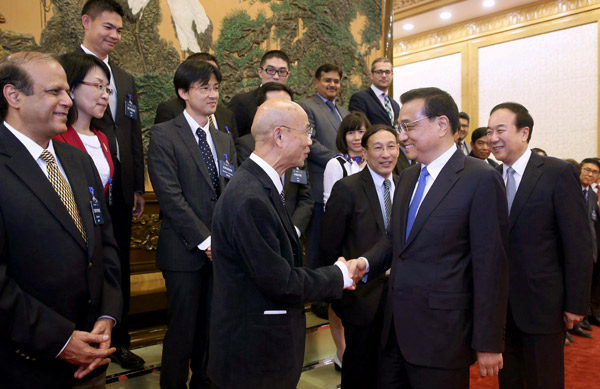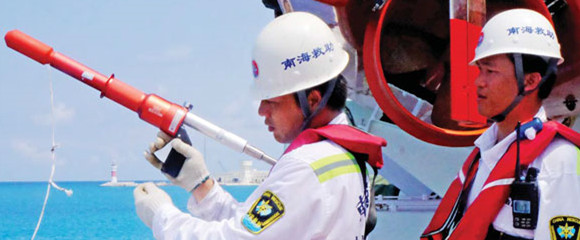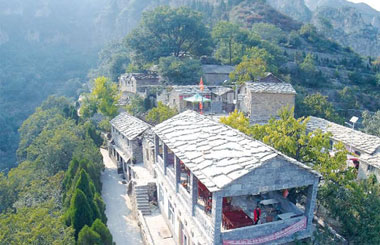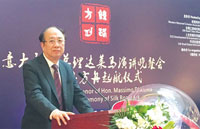Premier Li Keqiang Meets Senior Editors of Asia News Network Members
Updated: 2016-06-01 21:37
(chinadaily.com.cn)
|
|||||||||
 |
|
Premier Li Keqiang, accompanied by China Daily Publisher and Editor in Chief Zhu Ling (right), meets Suthichai Yoon of Nation Multimedia Group of Thailand and other Asia News Network executives in the Great Hall of the People in Beijing on Tuesday. [Photo by Feng Yongbin/CHINA DAILY] |
Editor's note: On the afternoon of 31 May 2016, Premier Li Keqiang met and had dialogue with senior editors from Asia attending the annual meeting of the Asia News Network (ANN) in China at the Great Hall of the People. The following is the transcript of their dialogue:
Li Keqiang: It's very good to meet you all. Let me extend, on behalf of the Chinese government, warm welcome to you for coming to Beijing to attend the annual editors' meeting and congratulations on the success of the meeting. The ANN members are media of influence not only in Asia but also around the world. I hope the members will strengthen communication and build a platform for Asia to make its voice better heard, and I wish you greater success. I am happy to answer your questions.
ANN Executive Director Pana Janviroj: The ANN is one of the biggest of its kind in the world, with 21 members from 19 Asian countries. Our motto is: we know Asia better. It is a privilege to have this meeting with you this afternoon. Allow me to invite a few colleagues to speak.
Suthichai Saeyoon, founder of The Nation of Thailand: China has been developing very fast and its influence in the world has been rising. Southeast Asian countries have followed China's development closely as friends and partners. Meantime, China is a big country, or a superpower. Some small countries may feel that China may act as a "big brother" to use its political and economic muscle to advance its own purposes in negotiations. How can you make them reassured that China is not a bad "big brother" but a good "big brother"?
Li Keqiang: Let me first make two points. First, China is no “superpower”, but a developing country. Though being the biggest developing country with one of the largest economy in the world, China still ranks behind some 80 countries in terms of per capita GDP. We don't have the basis to be a superpower, still less do we intend to be one.
Second, in developing relations with its neighbors, China has never posed itself as a "big brother". China follows an independent foreign policy of peace, a neighborhood policy featuring amity, sincerity, mutual benefit and inclusiveness, and believes that all countries, big or small, are equals. We could all be good brothers and good friends when we share such sincere wish. There is no such thing as one being the "big brother".
China has 20 neighbors, sharing land border with some and facing some across the sea. China has more neighboring countries than any other country in the world. We and our neighbors are entwined in a community of shared future. China still has a long way to go before it can achieve modernization, and we need a stable regional environment and peaceful international environment to reach this goal. Hence, China is committed to upholding regional stability. In the meantime, we do have certain disagreements with some neighbors, but these differences are not the mainstream of China's relations with those countries, and our common interests far outweigh those differences. In addressing differences, China believes that countries should seek peaceful solutions through consultation on the basis of equality and mutual respect.
In keeping with such principles, I believe, China and all neighbors, in good faith, can be good friends, good neighbors and even good brothers.
Endy Mouzardi Bayuni, Editor-in-Chief of The Jakarta Post: This morning, we had a dialogue with head of the Asian Infrastructure Investment Bank (AIIB) about the Belt and Road Initiative. One important part is to build with relevant countries the maritime silk road. I am from Indonesia. My government has expressed support to this initiative, as it will help strengthen peace and cooperation between relevant countries. Meanwhile, China is making great efforts to build a blue water navy. They seem to send conflicting messages about China's intentions. How would you explain such discrepancies?
Li Keqiang: China has proposed to build the maritime silk road, which can be aligned with the development strategies of relevant countries, including Indonesia's maritime power strategy. Peace, cooperation and development have been the underlying spirit of the Silk Road.
China follows a defense policy that is defensive in nature. The development of our navy and the building of the maritime silk road do not conflict with each other. China has all along called for upholding the freedom and safety of navigation in the South China Sea and other maritime areas, a right enjoyed by all countries under the law. Freedom and safety of navigation provides enabling conditions for us to expand trade and exchanges, and engage in cooperation in wider fields for peace and security on the sea.
One should bear in mind that the Chinese believe in "not doing to others what one does not like oneself." The Chinese people suffered aggression and oppression in modern times, and we do not want to see similar things happen to other countries. By living in peace with other countries and developing its defense capability, China is upholding its own sovereignty and territorial integrity and contributing its part to regional peace and security.
Today's Top News
Russia to promote EAEU-China economic cooperation
AIIB 'set to earn international trust, credibility'
EIB and AIIB to strengthen cooperation
Some 13,000 migrants saved, over 700 dead
Economists urge go-slow on EU's anti-dumping
Chinese investors eye European soccer goal
Rescue vessel eyed for the Nansha Islands
Steeled for change
Hot Topics
Lunar probe , China growth forecasts, Emission rules get tougher, China seen through 'colored lens', International board,
Editor's Picks

|

|

|

|

|

|







